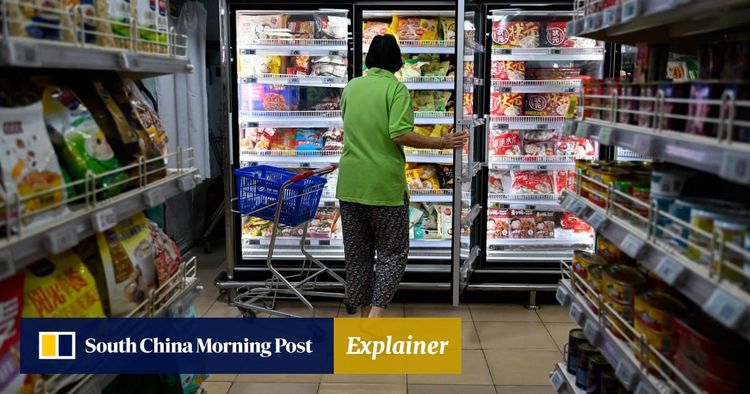‘Bout of deflation largely transitory’: 4 takeaways from China’s inflation data

China's August Inflation: 4 Insights As Consumer Prices Rise
If you're interested in viewing additional articles that we publish, kindly think about becoming our subscriber.
China's Deflation Eases
In August, the consumer price index (CPI) in China rose by 0.1% when compared to the same month last year. This means that consumer prices returned to a positive state after falling by 0.3% in July. On Saturday, data regarding this matter was released.
According to experts from Goldman Sachs, the inflation of China's headline CPI had a positive turn in August. This happened due to the decreased deflation in goods prices, which can be attributed to the increasing prices of crude oil.
In August, there was a slight increase in China's consumer prices by 0.1%. This indicates that there may be a lack of demand for goods and services.
The government of Beijing has established a goal to keep the Consumer Price Index (CPI) under 3 percent growth by 2023.
In the Consumer Price Index, the prices of food decreased by 1.7 percent compared to the previous year, but prices for non-food items increased by 0.5 percent.
According to the top economist from Oxford Economics, Louise Loo, the CPI's headline has reached a positive growth area in August compared to last year.
This was upheld by the growth in tourism facilities, traditional Chinese medication, and certain food items like eggs. These factors surpassed the significant decrease in prices of pork, vehicle fuels, and other meat and poultry products.
"Drop In Factory Prices Persists"
The gauge that measures the prices charged by factories to wholesalers in China, known as producer price index (PPI), decreased for the 11th month in a row during August.
The measurement dropped three percent compared to the same time last year, however it improved from its fall of 4.4 percent in July.
Loo explained that the PPI had improved slightly and this was mainly due to a lesser decrease in oil prices compared to the previous year. This is supported by the input cost and output price subindices in the purchasing managers' index which increased significantly to 56.5 and 52 respectively in August. The PMI survey also pointed out that companies' costs were slightly increasing which could have contributed to the smaller decrease in product prices.
According to experts from Goldman Sachs, the PPI inflation rate has risen due to the gradual increase in crude oil prices.
"July's Core Inflation Remains Steady"
In August, the primary consumer inflation rate in China, which doesn't include the unstable prices of food and energy, stayed the same as in July. However, compared to the previous year, there was an increase of 0.8 per cent.
According to Loo, the Core CPI increased by 0.8% compared to the previous year and has gone up for six straight months. Looking at past trends, it is improbable that the decrease in the value of the yuan in the same month had a substantial effect on the inflation rate in August.
What's The Future Of Inflation?
Experts at Goldman Sachs predict that the CPI will experience a recovery in a U-shape since energy prices are foreseen to reach their lowest point, while the inflation of services is anticipated to increase as the output gap becomes narrower.
The experts predict that there will be a continuation of PPI deflation in the upcoming months; however, the trend should gradually decrease.
According to Oxford Economics, the Consumer Price Index is predicted to increase by an average of 0.5% throughout the current year. Meanwhile, the Producer Price Index is expected to see a decline by an average of 3.2% on average.
According to experts, the CPI is expected to improve and reach 1.8% in the upcoming year, while the PPI is predicted to experience a growth of 1% by the year 2024.
Loo stated that the data backs up our belief that the recent deflation was mainly temporary. However, the overall trend of low prices still does not seem promising.
Some factors that impact the supply of goods, such as the lingering effects of high oil prices and the large amount of hog and pork meat still waiting to be sold, will prevent a significant increase in overall inflation. However, it's expected that inflation for core goods and services will continue to rise over the next few months.









































